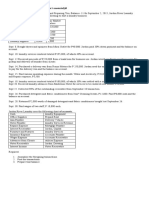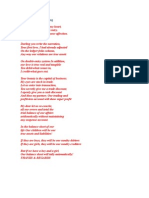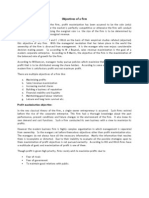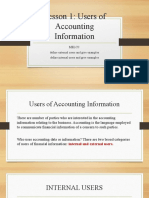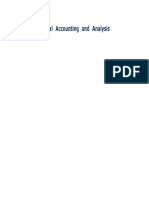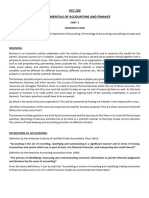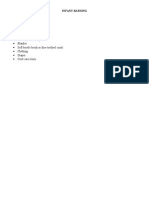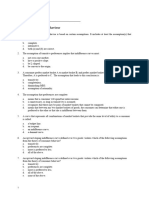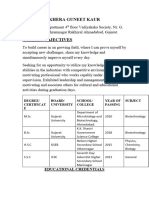Accounting Science or Art
Accounting Science or Art
Uploaded by
Mandeep BatraCopyright:
Available Formats
Accounting Science or Art
Accounting Science or Art
Uploaded by
Mandeep BatraCopyright
Available Formats
Share this document
Did you find this document useful?
Is this content inappropriate?
Copyright:
Available Formats
Accounting Science or Art
Accounting Science or Art
Uploaded by
Mandeep BatraCopyright:
Available Formats
LIST OF CONTENTS
1. INTRODUCTION 2. BRANCHES OF ACCOUNTING FINANCIAL ACCOUNTING COST ACCOUNTING MANAGEMENT ACCOUNTING
3. ROLE OF ACCOUNTING 4. NATURE OF ACCOUNTING ACCOUNTING AS A SERVICE ACTIVITY ACCOUNTING AS A PROFESSION ACCOUNTING AS A SOCIAL FORCE ACCOUNTING AS A LANGUAGE ACCOUNTING AS AN INFORMATION SYSTEM ACCOUNTING AS SCIENCE OR ART
5. ACCOUNTING (SCIENCE OR ART) 6. DEFINITIONS 7. REAL-LIFE EXAMPLES EXAMPLE 1 EXAMPLE 2 EXAMPLE 3 8. as
INTRODUCTION Accounting has rightly been termed as the language of the business. The basic function of a language is to serve as a means of communication Accounting also serves this function. It communicates the results of business operations to various parties who have some stake in the business viz., the proprietor, creditors, investors, Government and other agencies. Though accounting is generally associated with business but it is not only business which makes use of accounting. Persons like housewives, Government and other individuals also make use of a accounting. For example, a housewife has to keep a record of the money received and spent by her during a particular period. She can record her receipts of money on one page of her "household diary" while payments for different items such as milk, food, clothing, house, education etc. on some other page or pages of her diary in a chronological order. Such a record will help her in knowing about : The sources from which she received cash and the purposes for which it was utilized. Whether her receipts are more than her payments or vice-versa? The balance of cash in hand or deficit, if any at the end of a period. Example In case the housewife records her transactions regularly, she can collect valuable information about the nature of her receipts and payments. For example, she can find out the total amount spent by her during a period (say a year) on different items say milk, food, education, entertainment, etc. Similarly she can find the sources of her receipts such as salary of her husband, rent from property, cash gifts from her relatives, etc. Thus, at the end of a period
(say a year) she can see for herself about her financial position i.e., what she owns and what she owes. This will help her in planning her future income and expenses (or making out a budget) to a great extent. The need for accounting is all the more great for a person who is running a business. He must know : (i) (ii) (iii) What he owns? What he owes? Whether he has earn a profit or suffered a loss on account of running a business? (iv) What is his financial position i.e. whether he will be in a position to meet all his commitments in the near future or he is in the process of becoming a bankrupt.
BRANCHES OF ACCOUNTING To meet the ever increasing demands made on accounting by different interested parties such as owners, management, creditors, taxation authorities etc., the various branches have come into existence. There are as follows : 1. Financial accounting The object of financial accounting is to ascertain the results (profit or loss) of business operations during the particular period and to state the financial position (balance sheet) as on a date at the end of the period. 2. Cost accounting The object of cost accounting is to find out the cost of goods produced or services rendered by a business. It also helps the business in controlling the costs by indicating avoidable losses and wastes. 3. Management accounting The object of management accounting is to supply relevant information at appropriate time to the management to enable it to take decisions and effect control.
Financial accounting is the oldest and other branches have developed from it. The objects of financial accounting, as stated above, can be achieved only by recording the financial transactions in a systematic manner according to a set of principles. The art of recording financial transactions and events in a systematic manner in the books of account is known as book-keeping. However, mere record of transactions is not enough. The recorded information has to be classified, analysed and presented in a manner in which business results and financial position can be ascertained.
ROLE OF ACCOUNTING Accounting plays an important and useful role by developing the information for providing answers to many questions faced by the users of accounting information (1) How good or bad is the financial condition of the business? (2) Has the business activity resulted in a profit or loss ? (3) How well the different departments of the business have performed in the past? (4) Which activities or products have been profitable? (5) Out of the existing products which should be discontinued and the production of which commodities should be increased? (6) Whether to buy a component from the market or to manufacture the same? (7) Whether the cost of production is reasonable or excessive? (8) What has been the impact of existing policies on the profitability of the business? (9) What are the likely results of new policy decisions on future earning capacity of the business? (10) In the light of past performance of the business how should it plan for future to ensure desired results?
NATURE OF ACCOUNTING The various definitions and explanations of accounting has been propounded by different accounting experts from time to time and the following aspects comprise the nature of accounting : 1. ACCOUNTING AS A SERVICE ACTIVITY Accounting is a service activity. Its function is to provide quantitative information, primarily financial in nature, about economic entities that is intended to be useful in making economic decisions, in making reasoned
choices among alternative courses of action. It means that accounting collects financial information for the various users for taking decisions and tackling business issues. Accounting in itself cannot create wealth though, if it produces information which is useful to others, it may assist in wealth creation and maintenance. 2. ACCOUNTING AS A PROFESSION Accounting is very much a profession. A profession is a career that involve the acquiring of a specialized formal education before rendering any service. Accounting is a systematized body of knowledge developed with the development of trade and business over the past century. The accounting education is being imparted to the examinees by national and international recognized the bodies like The Institute of Chartered Accountants of India (ICAI), New Delhi in India and American Institute of Certified Public Accountants (AICPA) in USA7 etc. The candidate must pass a vigorous examination in Accounting Theory, Accounting Practice, Auditing and Business Law. The members of the professional bodies usually have their own associations or organizations, where in they are required to be enrolled compulsorily as Associate member of the Institute of Chartered Accountants (A.C.A.) and fellow of the Institute of Chartered Accountants (F.C.A.). In a way, accountancy as a profession has attained the stature comparable with that of lawyer, medicine or architecture. 3. ACCOUNTING AS A SOCIAL FORCE In early days, accounting was only to serve the interest of the owners. Under the changing business environment the discipline of accounting and the accountant both have to watch and protect the interests of other people who are directly or indirectly linked with the operation of modern business. The society is composed of people as customer, shareholders, creditors and investors. The accounting information/data is to be used to solve the problems of the public at large such as determination and
controlling of prices. Therefore, safeguarding of public interest can better be facilitated with the help of proper, adequate and reliable accounting information and as a result of it the society at large is benefited. 4. ACCOUNTING AS A LANGUAGE Accounting is rightly referred the "language of business". It is one means of reporting and communicating information about a business. As one has to learn a new language to converse and communicate, so also accounting is to be learned and practised to communicate business events. A language and accounting have common features as regards rules and symbols. Both are based and propounded on fundamental rules and symbols. In language these are known as grammatical rules and in accounting, these are termed as accounting rules. The expression, exhibition and presentation of accounting data such as a numerals and words and debits and credit are accepted as symbols which are unique to the discipline of accounting. 5. ACCOUNTING AS AN INFORMATION SYSTEM Accounting discipline will be the most useful one in the acquisition of all the business knowledge in the near future. You will realise that people will be constantly exposed to accounting information in their everyday life. Accounting information serves both profit-seeking business and non-profit organisations. The accounting system of a profit-seeking organisation is an information system designed to provide relevant financial information on the resources of a business and the effect of their use. Information is relevant and valuable if the decision makers can use it to evaluate the financial consequences of various alternatives. Accounting generally does not generate the basic information (raw financial data), rather the raw financial data result from the day to day transactions of the business. As an information system, accounting links an information source or transmitter (generally the accountant), a channel of communication
(generally the financial statements) and a set of receivers (external users). 6. ACCOUNTING AS SCIENCE OR ART Science is a systematised body of knowledge. It establishes a relationship of cause and effect in the various related phenomenon. It is also based on some fundamental principles. Accounting has its own principles e.g. the double entry system, which explains that every transaction has two fold aspect i.e. debit and credit. It also lays down rules of journalising. So we can say that accounting is a science. Art requires a perfect knowledge, interest and experience to do a work efficiently. Art also teaches us how to do a work in the best possible way by making the best use of the available resources. Accounting is an art as it also requires knowledge, interest and experience to maintain the books of accounts in a systematic manner. Everybody cannot become a good accountant. It can be concluded from the above discussion that accounting is an art as well as a science.
ACCOUNTING (SCIENCE OR ART) Accounting is both an art and science. An art because it can be learnt by practice and not by mere listening to it like scientific rules. Every accountant is not same. Many are good and other make mistakes, like every person is not a great artist. A person who is having more experience in accounting, will be able to understand every new transaction, new developments and new changes in accounting more easily than an inexperienced one. It is science because it is based on many rules, concepts, conventions and assumptions. If everything goes accordingly, your balance sheets match, trial balances match and profits can be calculated correctly. But even if a single accounting concept is mishandled and transaction is entered incorrectly, it brings propagation errors. We need to go back every step to trace it, which is very exhausting. So its a science. In simple words, science establishes relationship of cause and effect whereas art is the application of knowledge comprising of some accepted theories and rules. DEFINITIONS Accounting is an art of recording financial transaction in a set of book; classifying in desired categories and summarizing the information for presentation in a suitable manner to the concerned persons for their benefit. Accounting is also science in the sense that it comprises of rules, principles, concepts, conventions and standards. All these form body of knowledge which has recognitions all over the world. The term GAAP denotes generally accepted accounting principles. At present we have International Accounting Standards Committee also.
REAL-LIFE EXAMPLES Example 1 In January 2008, before the word recession was used by media, but reflecting sensitivity to national and local economic developments, HBLA issued a White Paper to our clients and friends entitled Responding to the Anticipated 2008 Economic Recession. In this article we summarized the current economic trends and then went on to make recommendations focusing on capital preservation, cost reductions, and similar areas. Example 2 Following up on the White Paper, we met regularly with clients to address new economic developments, and, where requested, assisted them to implement our published recommendations. In addition, our monthly newsletter continued periodic updates on the economy and other business and tax developments. Example 3 In the latter part of 2009, we issued another White Paper titled Preparing for the End of the Recession. The paper discussed the importance of accurate cash forecasting to identify working capital needs. Cash would be needed to replenish inventory and receivables that were significantly reduced during the prior years. Accurate information would be necessary to work with financial institutions to assure adequate sources of financing for the upcoming growth. As we all know, things are moving a little slower than anticipated, but the recommendations and action steps are still applicable.
You might also like
- Show That The Accounting Equation Is Satisfied After Taking Into Consideration Each of The Following Transactions in The Books of MRDocument3 pagesShow That The Accounting Equation Is Satisfied After Taking Into Consideration Each of The Following Transactions in The Books of MRLysss Epssss0% (2)
- DaburDocument22 pagesDaburMandeep BatraNo ratings yet
- Concept of BusinessDocument2 pagesConcept of BusinessHarishYadav100% (3)
- PRACTICE MATERIAL - Accounting EquationDocument6 pagesPRACTICE MATERIAL - Accounting EquationWaqar Ahmad100% (2)
- Scope of Business EthicsDocument5 pagesScope of Business Ethicsnana75% (4)
- Basic Accounting Reviewer Step 1 To 3Document12 pagesBasic Accounting Reviewer Step 1 To 3Mary Gleyne100% (1)
- Basic Accounting ProblemsDocument5 pagesBasic Accounting ProblemsKaren Joy Jacinto Ello100% (1)
- Exercise 8 10Document1 pageExercise 8 10Steve Duty50% (4)
- Accounting Essay QuestionsDocument4 pagesAccounting Essay Questionsym5c2324100% (1)
- Week 1 AccountingDocument5 pagesWeek 1 AccountingWawie Cañete50% (2)
- ACCOUNTING CONCEPTS and AssignmentDocument21 pagesACCOUNTING CONCEPTS and AssignmentSumiya YousefNo ratings yet
- Muslim-Christian Polemic During The Crusades The Letter From The People of Cyprus and Ibn Abi Talib Al-Dimashqi's Response PDFDocument525 pagesMuslim-Christian Polemic During The Crusades The Letter From The People of Cyprus and Ibn Abi Talib Al-Dimashqi's Response PDFHiroNo ratings yet
- AFM - MBA-1ST SemDocument440 pagesAFM - MBA-1ST SemSunny Mittal67% (3)
- Accounting Assumptions and PrinciplesDocument2 pagesAccounting Assumptions and PrinciplesNoaj Palon100% (2)
- Chapter 2 Fundamentals of Accounting ConceptsDocument27 pagesChapter 2 Fundamentals of Accounting Conceptshaider_shah882267100% (1)
- Accounting Love PoemDocument1 pageAccounting Love PoemAshwini100% (1)
- Description Account Title SFP Element: Accounts PayableDocument4 pagesDescription Account Title SFP Element: Accounts PayableEnrique BongaisNo ratings yet
- Chapter 4Document38 pagesChapter 4Haidee Sumampil75% (4)
- 5 Main Elements of Financial StatementsDocument8 pages5 Main Elements of Financial StatementsMuhammad Nazmuddin100% (2)
- Characteristics of AccountingDocument5 pagesCharacteristics of AccountingAhmer Tariq50% (2)
- Balance SheetDocument16 pagesBalance SheetFam Sin Yun100% (1)
- Quiz For AccountingDocument1 pageQuiz For AccountingKelvin Jay Sebastian Sapla50% (2)
- Nature and Scope of AccountingDocument10 pagesNature and Scope of AccountingRohan Kumar100% (6)
- Far 1 - Activity 1 - Sept. 09, 2020 - Answer SheetDocument4 pagesFar 1 - Activity 1 - Sept. 09, 2020 - Answer SheetAnonn100% (1)
- Senior High School Department: Quarter 3 - Module 12: Adjusting Journal EntriesDocument14 pagesSenior High School Department: Quarter 3 - Module 12: Adjusting Journal EntriesJaye Ruanto100% (2)
- 12 Trial Balance and RectificationDocument9 pages12 Trial Balance and RectificationZaheer Ahmed SwatiNo ratings yet
- Nature of AccountingDocument2 pagesNature of AccountingElla Simone100% (5)
- Objectives of A FirmDocument3 pagesObjectives of A Firmyasheshgaglani100% (1)
- Crafting StrategyDocument16 pagesCrafting StrategyKathlynJoySalazar67% (3)
- Buss-Finance QTR-4-WK-1-4Document35 pagesBuss-Finance QTR-4-WK-1-4Yuri TagalaNo ratings yet
- 7 The Accounting CycleDocument3 pages7 The Accounting Cycleapi-299265916No ratings yet
- Entrepreneurial Motivation: Motivating FactorsDocument5 pagesEntrepreneurial Motivation: Motivating Factorsvinod123456No ratings yet
- Lesson 4-3Document20 pagesLesson 4-3Alexis Nicole Joy Manatad100% (3)
- Nature, Purpose and Scope of Directing.Document10 pagesNature, Purpose and Scope of Directing.Saffa Ibrahim0% (1)
- Review of Journal Entries, T-Accounts, General Ledger and Trial BalanceDocument9 pagesReview of Journal Entries, T-Accounts, General Ledger and Trial BalanceJasper Briones II100% (1)
- Keynesian Liquidity PreferenceDocument14 pagesKeynesian Liquidity PreferenceCarol Sanga100% (1)
- Fabm Analysis and Interpretation of Financial Statements 1Document4 pagesFabm Analysis and Interpretation of Financial Statements 1Mylen Noel Elgincolin Manlapaz67% (6)
- Modern OfficeDocument10 pagesModern OfficesonuNo ratings yet
- Tools of Working CapitalDocument34 pagesTools of Working CapitalShiva Prasad33% (3)
- Users of Accounting InformationDocument6 pagesUsers of Accounting InformationMylene Santiago100% (1)
- Test Bank 4Document5 pagesTest Bank 4Jinx Cyrus RodilloNo ratings yet
- Abm Accountancy Lesson 1Document23 pagesAbm Accountancy Lesson 1Felixberto Dominic Bermudez Eruela55% (20)
- Module 0 Review Accounting 1 PDFDocument40 pagesModule 0 Review Accounting 1 PDFJmaseNo ratings yet
- Unit 4 Accounting For Price Level ChangesDocument6 pagesUnit 4 Accounting For Price Level ChangeskunjapNo ratings yet
- Ortiz, John Paul HRM 1-4Document5 pagesOrtiz, John Paul HRM 1-4John Paul Aguilar OrtizNo ratings yet
- The Impact of Accounting Information On Decision Making ProcessDocument8 pagesThe Impact of Accounting Information On Decision Making ProcessEmesiani Tobenna100% (3)
- Demand AnalysisDocument4 pagesDemand AnalysisSounakNo ratings yet
- Chapter 1 2 3Document14 pagesChapter 1 2 3Airon BendañaNo ratings yet
- Problems On Cash Flow StatementsDocument12 pagesProblems On Cash Flow StatementsAnjali Mehta100% (1)
- November 20, 2019 Lesson - FINANCIAL STATEMENT PREPARATIONDocument139 pagesNovember 20, 2019 Lesson - FINANCIAL STATEMENT PREPARATIONMarkus Bernabe Davira67% (3)
- CHAPTER 1 (Financial Accounting and Reporting)Document2 pagesCHAPTER 1 (Financial Accounting and Reporting)Wawex DavisNo ratings yet
- Basic Accounting Test Questions1Document4 pagesBasic Accounting Test Questions1Ervin CabangalNo ratings yet
- LedgerDocument9 pagesLedgerPatricia Mariz V. LoriñaNo ratings yet
- Module 3Document47 pagesModule 3Harrold HarryNo ratings yet
- FABM 2 Week 4Document3 pagesFABM 2 Week 4JayMoralesNo ratings yet
- Accounting and Financial Analysis Lecture Notes Lectures 1 10 PDFDocument57 pagesAccounting and Financial Analysis Lecture Notes Lectures 1 10 PDFNush Ahmd100% (1)
- INTRODUCTION TO FINANCIAL ACCOUNTING unit 1Document24 pagesINTRODUCTION TO FINANCIAL ACCOUNTING unit 1Ganesh RNo ratings yet
- Financial Accounting and AnalysisDocument19 pagesFinancial Accounting and AnalysisShivam ChandraNo ratings yet
- Introduction To AccountingDocument19 pagesIntroduction To AccountingKitea ChhakchhuakNo ratings yet
- Faa Bba Sem I - Unit 1 and 2Document14 pagesFaa Bba Sem I - Unit 1 and 2kochars321No ratings yet
- ACCOUNTS NotesDocument11 pagesACCOUNTS Noteslalteshsharma335No ratings yet
- ACC 102 Lecture Notes - Complied by Mr. Abraham OnajiDocument11 pagesACC 102 Lecture Notes - Complied by Mr. Abraham OnajiVandemarkNo ratings yet
- Ratio GlosterDocument9 pagesRatio GlosterMandeep BatraNo ratings yet
- Enduring ValueDocument6 pagesEnduring ValueMandeep BatraNo ratings yet
- PidiliteDocument21 pagesPidiliteMandeep BatraNo ratings yet
- Balance Sheet Statement of Profit and Loss: As at 31st March, 2020 For The Year Ended 31st March, 2020Document1 pageBalance Sheet Statement of Profit and Loss: As at 31st March, 2020 For The Year Ended 31st March, 2020Mandeep BatraNo ratings yet
- DaburDocument45 pagesDaburMandeep BatraNo ratings yet
- Ratio Philips CarbonDocument9 pagesRatio Philips CarbonMandeep BatraNo ratings yet
- Balance Sheet: ASAT31 MARCH, 2017Document2 pagesBalance Sheet: ASAT31 MARCH, 2017Mandeep BatraNo ratings yet
- Balance Sheet: As at 31st March, 2019Document2 pagesBalance Sheet: As at 31st March, 2019Mandeep BatraNo ratings yet
- Segment DaburDocument6 pagesSegment DaburMandeep BatraNo ratings yet
- InfosysDocument13 pagesInfosysMandeep BatraNo ratings yet
- Ratio ShreeDocument12 pagesRatio ShreeMandeep BatraNo ratings yet
- RATIO HavellsDocument22 pagesRATIO HavellsMandeep BatraNo ratings yet
- PBL Algebra: Vedant Sachin Shrotriya Class - Vi - BDocument8 pagesPBL Algebra: Vedant Sachin Shrotriya Class - Vi - BMandeep BatraNo ratings yet
- BST Eco ListDocument2 pagesBST Eco ListMandeep BatraNo ratings yet
- King Ancient Egypt Valley of The Kings: BCE BCEDocument12 pagesKing Ancient Egypt Valley of The Kings: BCE BCEMandeep BatraNo ratings yet
- Evolution of Consumer MovementDocument11 pagesEvolution of Consumer MovementMandeep BatraNo ratings yet
- Candidate Name Centre Number Candidate Number Module (Shade One Box) Academic General Training Test DateDocument6 pagesCandidate Name Centre Number Candidate Number Module (Shade One Box) Academic General Training Test DateMandeep BatraNo ratings yet
- Book ReviewDocument3 pagesBook ReviewMandeep BatraNo ratings yet
- Chaser'Document5 pagesChaser'Mandeep Batra100% (1)
- Case Study: Tea IndustryDocument8 pagesCase Study: Tea IndustryMandeep BatraNo ratings yet
- India: Cyber Crimes inDocument2 pagesIndia: Cyber Crimes inMandeep BatraNo ratings yet
- Childhood & Early Life Contributions As A Scientist Contributions As President of India Awards & AchievementsDocument10 pagesChildhood & Early Life Contributions As A Scientist Contributions As President of India Awards & AchievementsMandeep BatraNo ratings yet
- Working ListDocument4 pagesWorking ListMandeep BatraNo ratings yet
- About Oriental Bank of CommerceDocument10 pagesAbout Oriental Bank of CommerceMandeep BatraNo ratings yet
- Maagouz Ayman CVDocument1 pageMaagouz Ayman CVissam ENNADIFNo ratings yet
- Infant BathingDocument3 pagesInfant BathingPaul Mark Pilar100% (1)
- CH 6 TutDocument39 pagesCH 6 Tutmohd fahmiNo ratings yet
- 2004 AnthologyDocument172 pages2004 AnthologykevinmerkelzNo ratings yet
- Uranium Deposits of PakistanDocument5 pagesUranium Deposits of PakistanMuhammad RizwanNo ratings yet
- CV of GKDocument4 pagesCV of GKgunitk2021No ratings yet
- Artificial neural network modelling for asphaltDocument20 pagesArtificial neural network modelling for asphaltRomharsh OliNo ratings yet
- OD SurveyDocument16 pagesOD SurveyShailuSree100% (1)
- Physics For Scientists and Engineers Foundations and Connections Advance Edition Volume 2 1st Edition Katz Solutions ManualDocument38 pagesPhysics For Scientists and Engineers Foundations and Connections Advance Edition Volume 2 1st Edition Katz Solutions Manualmageaugalema100% (1)
- Rank & Title Imdb Rating Your Rating 9.2Document16 pagesRank & Title Imdb Rating Your Rating 9.2Amit YadavNo ratings yet
- Camp ApplianceDocument1 pageCamp ApplianceflyzalNo ratings yet
- NEW AMAZE 3GDocument1 pageNEW AMAZE 3G1morebeNo ratings yet
- Birth Certificate FormDocument5 pagesBirth Certificate FormEric MitieloNo ratings yet
- Water and or Bodies of Water As Motif in Genevieve Asenjo's Selected PoemsDocument22 pagesWater and or Bodies of Water As Motif in Genevieve Asenjo's Selected PoemsBeiya ClaveriaNo ratings yet
- Zenith Interface Unit - Setup and Configuration Manual (For Use With Zenith Choke Assembly)Document51 pagesZenith Interface Unit - Setup and Configuration Manual (For Use With Zenith Choke Assembly)Noelia Janet GutierrezNo ratings yet
- Design Guide For PET Bottle RecyclabilitDocument38 pagesDesign Guide For PET Bottle RecyclabilitSheena GomezNo ratings yet
- No-8, Darthlalang DT 28.3.2015 PDFDocument4 pagesNo-8, Darthlalang DT 28.3.2015 PDFJohn LaldingnghetaNo ratings yet
- Nokia Information SystemDocument3 pagesNokia Information SystemRia Singh67% (3)
- Calloway (Cab) PDFDocument22 pagesCalloway (Cab) PDFDamion Hale100% (1)
- Performance Task E-PortfolioDocument2 pagesPerformance Task E-Portfolioapi-482110307No ratings yet
- HamletDocument5 pagesHamletАлександр МоскальчукNo ratings yet
- Errq StrategyDocument1 pageErrq Strategymeymirah100% (1)
- The Yellow WallpaperDocument8 pagesThe Yellow WallpaperSakchhi SinghNo ratings yet
- 6-Sinf Form of CommunicationDocument6 pages6-Sinf Form of Communicationakmalablaqulov2014No ratings yet
- Resume TemplateDocument2 pagesResume Templateapi-407859718No ratings yet
- NCB May 2012Document303 pagesNCB May 2012parisaraNo ratings yet
- SIP Project FinaniceDocument32 pagesSIP Project Finanicerahulgandole132000No ratings yet
- Ichimoku Kinko Hyo Trading Explained - PDF Download: Japanese ChartingDocument13 pagesIchimoku Kinko Hyo Trading Explained - PDF Download: Japanese ChartingEko Aji WahyudinNo ratings yet
- Condition and Direction of Modern Education of BiharDocument5 pagesCondition and Direction of Modern Education of BiharShyam KumarNo ratings yet







